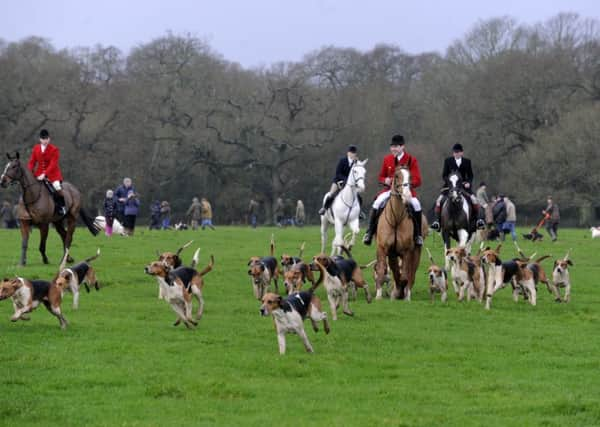Tim Bonner: Law based on bigotry and lies will not stop hunting


No sane person can defend a law which says that it is fine to hunt a rabbit, but not a hare, or a rat, but not a mouse; which bans hunting a fox with three hounds, but says it is okay with two; and which bans one method of killing foxes and other mammals whilst others remain perfectly legal when there is not a jot of evidence that hunting is less humane than the alternatives.
In the end everyone knows that the Hunting Act was about politics, rather than an honest attempt to deal with an issue on the basis of animal welfare, which is why the result was such an unholy mess.
Advertisement
Hide AdAdvertisement
Hide AdYou might think that whatever its failings this has no impact on you, but I am afraid that you would be wrong, because you are continuing to pay for the pointless pursuit of the hunting community.
The Hunting Act came into force in 2005 and new Government figures record that 423 people have been convicted of hunting offences in the 11 years to the end of 2015. The problem is that almost none of those people had anything to do with the ‘hunts’ that the whole pointless political debate was about.
No one connected to any of the over 300 registered hunts in England and Wales has been convicted of a hunting offence for over two years.
Of those 423 people who have been convicted, 94 per cent were involved in casual hunting or poaching rather than anything that would be recognised as ‘hunting’ by those MPs who so obsessively pursued the ban. Most of those convicted would have been guilty of offences which pre-existed the Hunting Act anyway.
Advertisement
Hide AdAdvertisement
Hide AdDespite this, animal rights groups are still spending hundreds of thousands of pounds (often of charitable donations) carrying out ‘investigations’ of hunts, sometimes involving lengthy covert surveillance operations, which inevitably lead to pointless police allegations.
You may want your local police officers spending their time investigating real crimes, but they have a legal obligation to investigate allegations, however spurious and however much police resources could be better used elsewhere.
The Government figures for 2015 record 92 people prosecuted for Hunting Act offences include three people connected to two hunts in Yorkshire which were subject to ‘covert surveillance’ operations by an animal rights charity.
After lengthy investigations and much wasted police time, the two cases reached court where all three were emphatically found not guilty.
Advertisement
Hide AdAdvertisement
Hide AdLikewise the last case against a hunt to reach court, in Devon, was an attempt by an anti-hunting group to bring a private prosecution.
It took two years to get to trial, but ended in two days when the prosecution’s expert witness was found to have hidden his close relationship to other witnesses. This is another classic example of the waste of resources and court time directly attributable to the Hunting Act.
The reality is that the Hunting Act has failed in the primary purpose: to get rid of hunts.
As one anti-hunting MP famously admitted: “Now that hunting has been banned, we ought at last to own up to it: the struggle over the Bill was not just about animal welfare and personal freedom, it was class war.”
Advertisement
Hide AdAdvertisement
Hide AdThe dwindling number of animal rights activists who remain obsessed with hunts are angry that their (completely misplaced) class war has failed and that hunts have maintained their infrastructure, their kennels and their hounds, whilst support in the rural community has, if anything, grown. Boxing Day will show this. The law that was supposed to have got rid of hunts is now being used as little more than a vehicle to harass them.
Last year we saw a reasonable attempt to amend the legislation in a way that should have been perfectly acceptable to sensible people. It would have helped hunts, especially in the uplands, keep on top of the fox population, but SNP MPs decided to conduct a 180 degree turn on their previous commitment not to engage on legislation that does not affect Scotland, and the amendment was withdrawn.
This issue is not, however, going to go away because it is about much more than just packs of hounds and foxes.
It has become less a debate about animal welfare, and more about the ability of one group of people in society to impose its will on another.
Advertisement
Hide AdAdvertisement
Hide AdIn the end, the Hunting Act is a deeply prejudiced judgement on people who hunt, rather than a reasoned assessment of the impact of hunting on animal welfare and wildlife management.
That is why people will not stop hunting, as will be self-evident across the country on Boxing Day, and why the Hunting Act will remain on the political agenda in this Parliament, the next Parliament and the one after that until the debate is settled on the basis of principle and evidence rather than bigotry and lies.
Tim Bonner is chief executive of the Countryside Alliance.